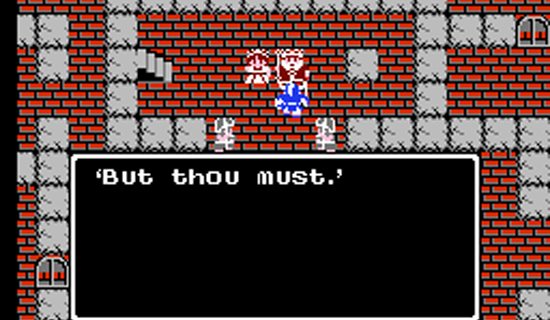Thanks, please never say that again
Eccitaze
And now we're in full mask-off accelerationist theory "it's okay to let Trump win as long as Democrats are punished" bullshit. You're unhappy with Democrats, so you're okay with letting throwing literally everyone on the left in the US under the bus, along with the entire country of Ukraine, and throwing even more bombs at Gaza.
What an entitled, smug, self-righteous, holier-than-thou position, utterly divorced from real life consequences. Thanks for admitting that you're a thoroughly unserious poster, though!
It's pretty okay. If you like the gameplay loop of scavenging parts to maintain and upgrade your car, and don't mind the roguelite elements, it's pretty fun, and it does a good job of creating tension--there's been multiple occasions where I wanted to loot more but I was out of time and likely to die if I stayed much longer.
The world building is immaculate, but IMO unfortunately the plot doesn't really pay off, and the ending isn't... super satisfying. It does enough to drive you along (no pun intended). The best part of the game is easily the soundtrack, and the best song in the soundtrack is easily The Freeze.
I'll say that Small Saga is fairly short--it'll only take you about 5-10 hours to beat it, including the optional bosses. I enjoyed it, definitely give it a shot.
Fine, you win, I misunderstood. I still disagree with your actual point, however. To me, Intelligence implies the ability to learn in real-time, to adapt to changes in circumstance, and for self-improvement. Once an LLM is trained, it is static and unchanging until you re-train it with new data and update the model. Even if you strip out the sapience/consciousness-related stuff like the ability to think critically about a scenario, proactively make decisions, etc., an LLM is only capable of regurgitating facts and responding to its immediate input. By design, any "learning" it can do is forgotten the instant the session ends.
The commercial aspect of the reproduction is not relevant to whether it is an infringement–it is simply a factor in damages and Fair Use defense (an affirmative defense that presupposes infringement).
What you are getting at when it applies to this particular type of AI is effectively whether it would be a fair use, presupposing there is copying amounting to copyright infringement. And what I am saying is that, ignoring certain stupid behavior like torrenting a shit ton of text to keep a local store of training data, there is no copying happening as a matter of necessity. There may be copying as a matter of stupidity, but it isn’t necessary to the way the technology works.
You're conflating whether something is infringement with defenses against infringement. Believe it or not, basically all data transfer and display of copyrighted material on the Internet is technically infringing. That includes the download of a picture to your computer's memory for the sole purpose of displaying it on your monitor. In practice, nobody ever bothers suing art galleries, social media websites, or web browsers, because they all have ironclad defenses against infringement claims: art galleries & social media include a clause in their TOS that grants them a license to redistribute your work for the purpose of displaying it on their website, and web browsers have a basically bulletproof fair use claim. There are other non-infringing uses such as those which qualify for a compulsory license (e.g. live music productions, usually involving royalties), but they're largely not very relevant here. In any case, the fundamental point is that any reproduction of a copyrighted work is infringement, but there are varied defenses against infringement claims that mean most infringing activities never see a courtroom in practice.
All this gets back to the original point I made: Creators retain their copyright even when uploading data for public use, and that copyright comes with heavy restrictions on how third parties may use it. When an individual uploads something to an art website, the website is free and clear of any claims for copyright infringement by virtue of the license granted to it by the website's TOS. In contrast, an uninvolved third party--e.g. a non-registered user or an organization that has not entered into a licensing agreement with the creator or the website (*cough* OpenAI)--has no special defense against copyright infringement claims beyond the baseline questions: was the infringement for personal, noncommercial use? And does the infringement qualify as fair use? Individual users downloading an image for their private collection are mostly A-OK, because the infringement is done for personal & noncommercial use--theoretically someone could sue over it, but there would have to be a lot of aggravating factors for it to get beyond summary judgment. AI companies using web scrapers to download creators' works do not qualify as personal/noncommercial use, for what I hope are bloody obvious reasons.
As for a model trained purely for research or educational purposes, I believe that it would have a very strong claim for fair use as long as the model is not widely available for public use. Once that model becomes publicly available, and/or is leveraged commercially, the analysis changes, because the model is no longer being used for research, but for commercial profit. To apply it to the real world, when OpenAI originally trained ChatGPT for research, it was on strong legal ground, but when it decided to start making it publicly available, they should have thrown out their training dataset and built up a new one using data in the public domain and data that it had negotiated a license for, trained ChatGPT on the new dataset, and then released it commercially. If they had done that, and if individuals had been given the option to opt their creative works out of this dataset, I highly doubt that most people would have any objection to LLM from a legal standpoint. Hell, they probably could have gotten licenses to use most websites' data to train ChatGPT for a song. Instead, they jumped the gun and tipped their hand before they had all their ducks in a row, and now everybody sees just how valuable their data is to OpenAI and are pricing it accordingly.
Oh, and as for your edit, you contradicted yourself: in your first line, you said "The commercial aspect of the reproduction is not relevant to whether it is an infringement." In your edit, you said "the infringement happens when you reproduce the images for a commercial purpose." So which is it? (To be clear, the initial download is infringing copyright both when I download the image for personal/noncommercial use, and also when I download it to make T-shirts with. The difference is that the first case has a strong defense against an infringement claim that would likely get it dismissed in summary, while the cases of making T-shirts would be straightforward claims of infringement.)
That factor is relative to what is reproduced, not to what is ingested. A company is allowed to scrape the web all they want as long as they don’t republish it.
The work is reproduced in full when it's downloaded to the server used to train the AI model, and the entirety of the reproduced work is used for training. Thus, they are using the entirety of the work.
I would argue that LLMs devalue the author’s potential for future work, not the original work they were trained on.
And that makes it better somehow? Aereo got sued out of existence because their model threatened the retransmission fees that broadcast TV stations were being paid by cable TV subscribers. There wasn't any devaluation of broadcasters' previous performances, the entire harm they presented was in terms of lost revenue in the future. But hey, thanks for agreeing with me?
Again, that’s the practice of OpenAI, but not inherent to LLMs.
And again, LLM training so egregiously fails two out of the four factors for judging a fair use claim that it would fail the test entirely. The only difference is that OpenAI is failing it worse than other LLMs.
It’s honestly absurd to try and argue that they’re not transformative.
It's even more absurd to claim something that is transformative automatically qualifies for fair use.
Get a load of this maroon, they think LLMs are actually sapient! Thanks, I needed that laugh.
FFS, the issue is not that the AI model "copies" the copyrighted works when it trains on them--I agree that after an AI model is trained, it does not meaningfully retain the copyrighted work. The problem is that the reproduction of the copyrighted work--i.e. downloading the work to the computer, and then using that reproduction as part of AI model training--is being done for a commercial purpose that infringes copyright.
If I went to DeviantArt and downloaded a random piece of art to my hard drive for my own personal enjoyment, that is a non-infringing reproduction. If I then took that same piece of art, and uploaded it to a service that prints it on a T-shirt, the act of uploading it to the T-shirt printing service's server would be infringing, since it is no longer being reproduced for personal enjoyment, but the unlawful reproduction of copyrighted material for commercial purpose. Similarly, if I downloaded a piece of art and used it to print my own T-shirts for sale, using all my own computers and equipment, that would also be infringing. This is straightforward, non-controversial copyright law.
The exact same logic applies to AI training. You can try to camouflage the infringement with flowery language like "mere extraction of relationships between components," but the purpose and intent behind AI companies reproducing copyrighted works via web scraping and downloading copyrighted data to their servers is to build and provide a commercial, for-profit service that is designed to replace the people whose work is being infringed. Full stop.
They literally do not pass the criteria. LLMs use the entirety of a copyrighted work for their training, which fails the "amount and substantiality" factor. By their very nature, LLMs would significantly devalue the work of every artist, author, journalist, and publishing organization, on an industry-wide scale, which fails the "Effect upon work's value" factor.
Those two alone would be enough for any sane judge to rule that training LLMs would not qualify as fair use, but then you also have OpenAI and other commercial AI companies offering the use of these models for commercial, for-profit purposes, which also fails the "Purpose and character of the use" factor. You could maybe argue that training LLMs is transformative, but the commercial, widespread nature of this infringement would weigh heavily against that. So that's at least two, and arguably three out of four factors where it falls short.
Spoiler alert, but Rosebud was his sled all along.


There was a period of blissful ignorance circa 2006 where the only thing I knew about him was that he was rich and starred in the apprentice. Then a black man became president and the world hasn't been free of his stench ever since.